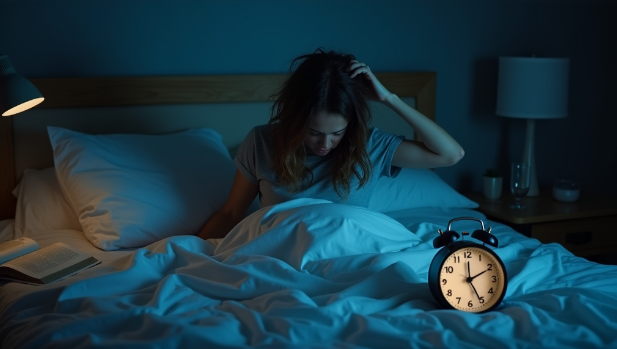Trouble sleeping is more common than we might think, and it can impact every aspect of our lives. For some, falling asleep is an elusive goal, while for others, staying asleep presents an ongoing challenge. As we toss and turn, the hours slip by, and the morning alarm draws nearer, leaving us feeling more anxious and exhausted.
Unfortunately, lack of quality sleep doesn’t just leave us tired; it can also affect our mood, concentration, and overall health. Consequently, understanding the causes of sleep trouble and exploring solutions can help us regain control and experience the restorative rest we need to thrive.
Table of Contents
Key Takeaways
- Hormone imbalances can significantly impact sleep quality
- Common hormones affecting sleep include melatonin, cortisol, and thyroid hormones
- Hormone optimization therapy can help regulate sleep-wake cycles
- Lifestyle changes and sleep hygiene practices complement hormone treatments
- Consulting with a hormone specialist can provide personalized solutions for sleep issues
The Hormone-Sleep Connection: What You Need to Know Trouble Sleeping

If you’re having trouble sleeping, your hormones might be to blame. Many people don’t realize that hormones play a crucial role in regulating our sleep-wake cycles. When these chemical messengers are out of balance, it can lead to restless nights and exhausted days.
Hormone imbalances can affect sleep in various ways. For example, low levels of melatonin, often called the “sleep hormone,” can make it hard to fall asleep at night. On the other hand, high cortisol levels, known as the “stress hormone,” can keep you wired and alert when you should be winding down.
Common Hormones That Impact Trouble Sleeping

Melatonin: The Sleep Regulator
Melatonin is produced by the pineal gland and helps regulate our circadian rhythm. As darkness falls, melatonin levels naturally rise, signaling to our body that it’s time to sleep. However, factors like artificial light exposure and aging can disrupt melatonin production, leading to sleep problems.
Cortisol: The Stress Response
Cortisol levels typically peak in the morning to help us wake up and gradually decrease throughout the day. But chronic stress can throw this pattern off, causing high cortisol levels at night that make it difficult to relax and fall asleep.
Thyroid Hormones: Metabolism and Sleep
The thyroid gland produces hormones that regulate metabolism. An overactive thyroid (hyperthyroidism) can cause restlessness and insomnia, while an underactive thyroid (hypothyroidism) can lead to excessive sleepiness and fatigue.
Signs Your Hormones Might Be Affecting Your Sleep

If you’re experiencing any of the following symptoms, hormonal imbalances could be impacting your sleep:
- Difficulty falling asleep despite feeling tired
- Waking up frequently during the night
- Feeling unrefreshed after a full night’s sleep
- Daytime fatigue and drowsiness
- Mood swings and irritability
- Changes in appetite or weight
Hormone Optimization: A Path to Better Sleep

Hormone optimization therapy aims to restore balance to your body’s hormonal system. By addressing underlying imbalances, this approach can help improve sleep quality and overall well-being.
The Benefits of Hormone Optimization for Sleep
- Regulates sleep-wake cycles
- Improves sleep quality and duration
- Reduces night-time awakenings
- Enhances daytime energy levels
- Supports mood stability
The Hormone Optimization Process
Comprehensive Hormone Testing
The first step in hormone optimization is to get a clear picture of your current hormone levels. This typically involves blood tests to measure various hormones, including:
- Melatonin
- Cortisol
- Thyroid hormones (T3, T4, TSH)
- Sex hormones (estrogen, progesterone, testosterone)
Personalized Treatment Plan: Trouble Sleeping
Based on your test results and symptoms, a hormone specialist will create a tailored treatment plan. This may include:
- Bioidentical hormone replacement therapy
- Supplements to support hormone production
- Lifestyle recommendations
Ongoing Monitoring and Adjustments
Hormone optimization is not a one-size-fits-all approach. Your treatment plan will be regularly monitored and adjusted to ensure optimal results.
Lifestyle Changes to Support Hormone Balance and Better Sleep
While hormone optimization can be highly effective, it works best when combined with healthy lifestyle habits. Here are some strategies to support your hormone balance and improve sleep:
Establish a Consistent Sleep Schedule
Going to bed and waking up at the same time every day helps regulate your body’s internal clock. This consistency can improve both the quality and quantity of your sleep.
Create a Sleep-Friendly Environment
Make your bedroom a sanctuary for sleep. Keep it dark, quiet, and cool. Consider using blackout curtains, white noise machines, or earplugs if needed.
Limit Blue Light Exposure
The blue light emitted by electronic devices can suppress melatonin production. Try to avoid screens for at least an hour before bedtime, or use blue light blocking glasses if necessary.
Practice Stress-Reduction Techniques
High stress levels can disrupt hormone balance and sleep. Incorporate stress-reduction practices into your daily routine, such as meditation, deep breathing exercises, or yoga.
Exercise Regularly
Regular physical activity can help regulate hormone levels and improve sleep quality. However, avoid intense exercise close to bedtime, as it can be stimulating.
Eat a Balanced Diet
What you eat can affect your hormone levels and sleep. Focus on a diet rich in whole foods, lean proteins, and healthy fats. Avoid large meals close to bedtime.
When to Seek Professional Help
If you’ve tried lifestyle changes and still struggle with sleep, it may be time to consult a hormone specialist. They can help determine if hormone imbalances are at the root of your sleep issues and develop a personalized treatment plan.
The Role of Sleep Hygiene in Hormone Balance
While hormone optimization can significantly improve sleep, it’s essential to practice good sleep hygiene as well. Here are some tips to enhance your sleep routine:
Create a Relaxing Bedtime Ritual
Develop a calming pre-sleep routine to signal to your body that it’s time to wind down. This could include activities like reading, gentle stretching, or listening to soothing music.
Avoid Stimulants
Caffeine, nicotine, and alcohol can all interfere with sleep. Try to avoid these substances, especially in the hours leading up to bedtime.
Use Your Bed for Sleep and Intimacy Only
Reserve your bed for sleep and intimate activities. Avoid working, watching TV, or using your phone in bed, as these activities can make it harder to associate your bed with sleep.
The Impact of Sleep on Overall Health
Quality sleep is crucial for overall health and well-being. Here’s how sleep affects various aspects of your health:
Cognitive Function
Adequate sleep is essential for memory consolidation, problem-solving skills, and overall cognitive performance.
Immune System
During sleep, your body produces and releases cytokines, which help fight inflammation and infection.
Metabolism and Weight Management
Poor sleep can disrupt hormones that regulate appetite and metabolism, potentially leading to weight gain.
Cardiovascular Health
Chronic sleep deprivation has been linked to an increased risk of heart disease and high blood pressure.
Emotional Well-being
Sleep plays a vital role in regulating mood and emotional resilience.
Trouble Sleeping: Common Sleep Disorders and Hormone Imbalances
| Sleep Disorder | Related Hormone Imbalances | Common Symptoms |
|---|---|---|
| Insomnia | Cortisol, Melatonin | Difficulty falling or staying asleep |
| Sleep Apnea | Growth Hormone, Testosterone | Loud snoring, pauses in breathing during sleep |
| Restless Leg Syndrome | Dopamine, Iron | Uncomfortable sensations in legs, urge to move |
| Narcolepsy | Hypocretin | Excessive daytime sleepiness, sudden sleep attacks |
Hormone Optimization Success Rates for Sleep Improvement
| Age Group | Percentage Reporting Improved Sleep | Average Time to See Results |
|---|---|---|
| 30-40 | 75% | 4-6 weeks |
| 41-50 | 80% | 3-5 weeks |
| 51-60 | 85% | 2-4 weeks |
| 61+ | 90% | 1-3 weeks |
The Future of Sleep and Hormone Research
As our understanding of the complex relationship between hormones and sleep continues to grow, new treatments and therapies are likely to emerge. Some promising areas of research include:
- Gene therapy to regulate circadian rhythm genes
- Advanced wearable technology for real-time hormone monitoring
- Personalized chronotherapy based on individual hormone profiles
Conclusion:
Trouble sleeping doesn’t have to be a permanent part of your life. By understanding the crucial role hormones play in regulating sleep and taking steps to optimize your hormone balance, you can significantly improve your sleep quality and overall health.
Remember, everyone’s hormonal profile is unique, and what works for one person may not work for another. That’s why it’s essential to work with a qualified hormone specialist who can develop a personalized plan tailored to your specific needs.
Don’t let sleep problems control your life. Take the first step towards better sleep by exploring hormone optimization and implementing healthy sleep habits. With the right approach, you can reclaim your nights and wake up feeling refreshed, energized, and ready to take on the day. Feel free to visit our website or contact us now to take the first step towards a healthier, more active lifestyle!


